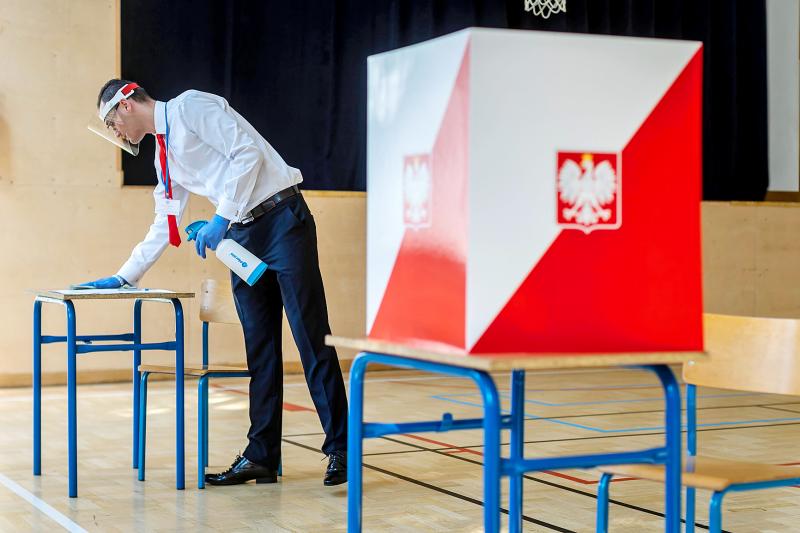Poles yesterday began voting in a presidential election that had been scheduled for last month, but was delayed by the COVID-19 pandemic, a ballot taking place amid deep cultural and political divisions in the EU nation.
Polish President Andrzej Duda, a 48-year-old conservative backed by the nationalist ruling Law and Justice party, is running against 10 other candidates as he seeks a second five-year term.
Whether Duda wins or not will determine whether the ruling party keeps its near-monopoly on political power in Poland.

Photo: AFP
Most recent polls showed that no single candidate was likely to reach the 50 percent required to avoid a runoff. In that case, the two top vote-getters would face each other on July 12.
Polling stations remain open until 9pm, and exit polls are to be announced immediately afterward. The final official results are expected by Wednesday at the latest.
Poland has not been as badly hit by the pandemic as many countries in Western Europe, and most people were voting in person, though required to wear masks and observe other hygiene rules.
There was also a mail-in voting option, and thousands of voters in some southwestern regions with higher virus infection numbers were required to vote by mail.
As of yesterday, Poland had nearly 34,000 confirmed cases of COVID-19 among its 38 million people, with more than 1,400 deaths.
Duda’s campaign focused on defending traditional values in the mostly Catholic nation, while promising to raise living standards to Western European levels.
He took a position against same-sex marriage and adoption and denounced the LGBT rights movement as a dangerous “ideology.”
That kind of rhetoric — along with laws that have given his Law and Justice party much greater control over the justice system and the ability to harness public media to promote the government’s image — have raised concerns among some that Poland is following Hungary in eroding democratic norms established after communism collapsed three decades ago.
Duda’s strongest challenge comes from Warsaw Mayor Rafal Trzaskowski, also 48, who is backed by the centrist Civic Platform party.
On the campaign trail, Trzaskowski, has promised to keep Law and Justice’s popular social welfare spending programs while vowing to restore constitutional norms.
The other candidates include Szymon Holownia, a TV personality and journalist who had once studied to be a priest.
Holownia is unaffiliated with any party and has generated some enthusiasm among those tired of years of bickering between Law and Justice and Civic Platform, the country’s two main parties.
Also in the running are Robert Biedron, a left-wing politician who is Poland’s first openly gay presidential contender; Wladyslaw Kosiniak-Kamys, the head of an agrarian party; and Confederation party lawmaker Krzysztof Bosak.

Kehinde Sanni spends his days smoothing out dents and repainting scratched bumpers in a modest autobody shop in Lagos. He has never left Nigeria, yet he speaks glowingly of Burkina Faso military leader Ibrahim Traore. “Nigeria needs someone like Ibrahim Traore of Burkina Faso. He is doing well for his country,” Sanni said. His admiration is shaped by a steady stream of viral videos, memes and social media posts — many misleading or outright false — portraying Traore as a fearless reformer who defied Western powers and reclaimed his country’s dignity. The Burkinabe strongman swept into power following a coup in September 2022

‘FRAGMENTING’: British politics have for a long time been dominated by the Labor Party and the Tories, but polls suggest that Reform now poses a significant challenge Hard-right upstarts Reform UK snatched a parliamentary seat from British Prime Minister Keir Starmer’s Labor Party yesterday in local elections that dealt a blow to the UK’s two establishment parties. Reform, led by anti-immigrant firebrand Nigel Farage, won the by-election in Runcorn and Helsby in northwest England by just six votes, as it picked up gains in other localities, including one mayoralty. The group’s strong showing continues momentum it built up at last year’s general election and appears to confirm a trend that the UK is entering an era of multi-party politics. “For the movement, for the party it’s a very, very big

ENTERTAINMENT: Rio officials have a history of organizing massive concerts on Copacabana Beach, with Madonna’s show drawing about 1.6 million fans last year Lady Gaga on Saturday night gave a free concert in front of 2 million fans who poured onto Copacabana Beach in Rio de Janeiro for the biggest show of her career. “Tonight, we’re making history... Thank you for making history with me,” Lady Gaga told a screaming crowd. The Mother Monster, as she is known, started the show at about 10:10pm local time with her 2011 song Bloody Mary. Cries of joy rose from the tightly packed fans who sang and danced shoulder-to-shoulder on the vast stretch of sand. Concert organizers said 2.1 million people attended the show. Lady Gaga

SUPPORT: The Australian prime minister promised to back Kyiv against Russia’s invasion, saying: ‘That’s my government’s position. It was yesterday. It still is’ Left-leaning Australian Prime Minister Anthony Albanese yesterday basked in his landslide election win, promising a “disciplined, orderly” government to confront cost-of-living pain and tariff turmoil. People clapped as the 62-year-old and his fiancee, Jodie Haydon, who visited his old inner Sydney haunt, Cafe Italia, surrounded by a crowd of jostling photographers and journalists. Albanese’s Labor Party is on course to win at least 83 seats in the 150-member parliament, partial results showed. Opposition leader Peter Dutton’s conservative Liberal-National coalition had just 38 seats, and other parties 12. Another 17 seats were still in doubt. “We will be a disciplined, orderly